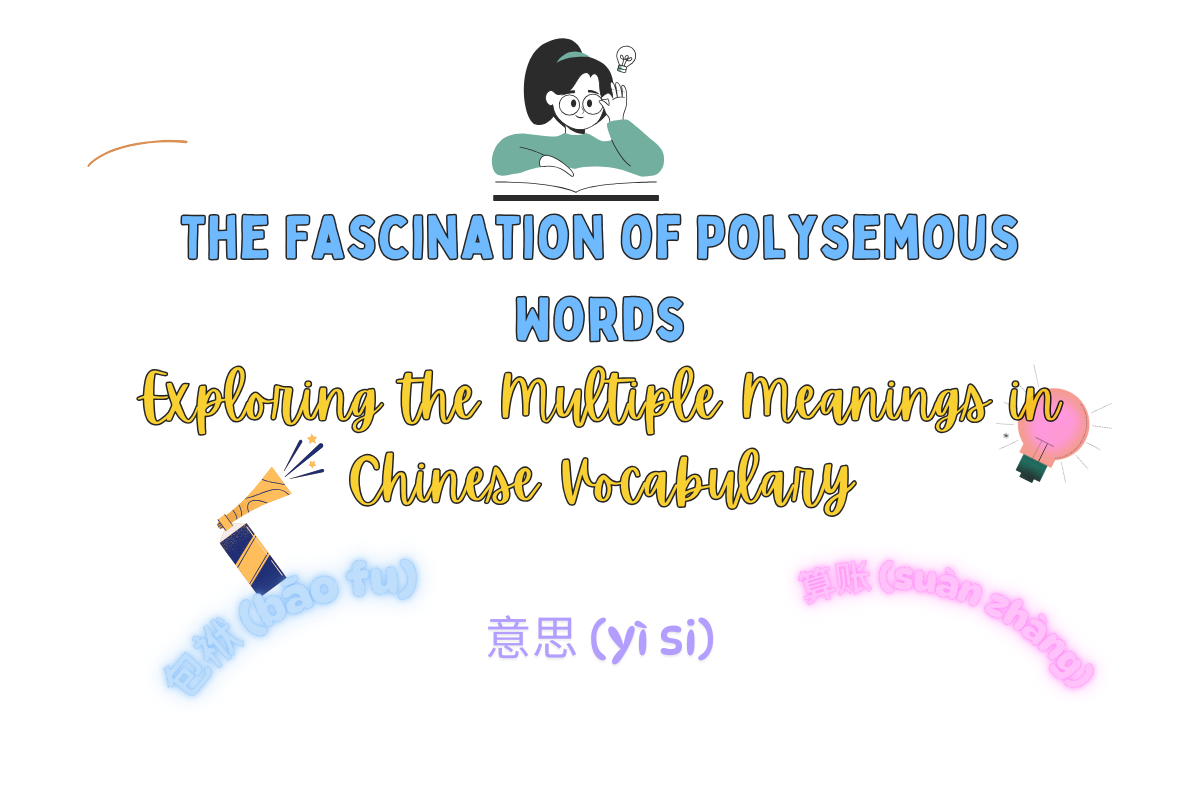The Fascination of Polysemous Words - Exploring the Multiple Meanings in Chinese Vocabulary
The richness of Chinese culture often leads to multiple meanings for a single word or phrase. Without understanding these "polysemous" terms, misunderstandings are inevitable and can even lead to humorous situations. Below, I will use dialogues or sentences involving the common words "包袱" (bāo fu), "算账" (suàn zhàng), and "意思" (yì si) to help you understand their various meanings.

包袱 (bāo fu)
-
Refers to a bundle of wrapped clothes or items.
Scenario: B is leaving the village with a bundle on his back and meets A.
A: Hey, fellow villager. Why are you carrying a bundle on your back?
嘿,老乡。你为什么背上背一个包袱啊?
hēi ,lǎo xiāng 。nǐ wèi shén me bèi shàng bēi yī gè bāo fu ā ?B: Because I'm going on a long journey.
因为我要出远门。
yīn wèi wǒ yào chū yuǎn mén -
Can indicate a certain burden, describing a person's psychological pressure.
Example:
This matter has burdened him mentally; perhaps it will take a long time for him to stop blaming himself.
这件事让他心里有了包袱,也许很久之后他才能不再自责。
zhè jiàn shì ràng tā xīn lǐ yǒu le bāo fu ,yě xǔ hěn jiǔ zhī hòu tā cái néng bù zài zì zé -
Refers to the punchlines or humorous elements in traditional Chinese comedic performances like crosstalk or sketches, causing laughter among the audience.
Scenario: A and B are watching comedians performing on stage.
A: Haha! This crosstalk has such great punchlines, it's so funny!
哈哈哈!这个相声太有包袱了,太好笑了!
hā hā hā !zhè gè xiàng sheng tài yǒu bāo fu le ,tài hǎo xiào le !B: Indeed, this crosstalk is very entertaining.
是的,这个相声太有意思了。
shì de ,zhè gè xiàng sheng tài yǒu yì si le
算账 (suàn zhàng)
-
Refers to calculating accounts or finances.
Example:
The boss is currently calculating the accounts.
这个老板正在算账。
zhè gè lǎo bǎn zhèng zài suàn zhàng -
Implies seeking retribution, retaliation, or controversy after being at a disadvantage or facing failure, showing an intent to hold someone responsible.
Scenario: B injures A in a fit of anger.
A: Wait and see, I'll remember that you hit me today! I'll come find you to settle the score tomorrow!
你等着,你今天打我这件事我记住了!明天我再来找你算账!
nǐ děng zhe ,nǐ jīn tiān dǎ wǒ zhè jiàn shì wǒ jì zhù le !míng tiān wǒ zài lái zhǎo nǐ suàn zhàng !B: Bring it on, whoever's afraid will retreat.
等着就等着,谁怕谁。
děng zhe jiù děng zhe ,shuí pà shuí
意思 (yì si)
-
Refers to the meaning of language or text.
Example:
What does this sentence mean? Can you explain it to me?
这句话是什么意思?你可以帮我解释下吗?
zhè jù huà shì shén me yì si ?nǐ kě yǐ bāng wǒ jiě shì xià ma ? -
Indicates something that brings enjoyment or pleasure to others.
Scenario: A is telling a story to B.
A: The story you told is really enjoyable. I want to hear more.
你说的这个故事真有意思。我还想听后续。
nǐ shuō de zhè gè gù shi zhēn yǒu yì si 。wǒ hái xiǎng tīng hòu xùB: Yes, this story always captivates people. I'll continue it for you tomorrow.
是的,这个故事总是能吸引人。我明天继续给你讲。
shì de ,zhè gè gù shi zǒng shì néng xī yǐn rén 。wǒ míng tiān jì xù gěi nǐ jiǎng -
Expresses someone's intentions, thoughts, or feelings.
Examples:
His intention is not to attend the banquet.
他的意思是不想参加宴会了。
tā de yì si shì bù xiǎng cān jiā yàn huì leDo you not understand my meaning? I've said it twice already.
我的意思你还不清楚吗?我已经说了两遍了。
wǒ de yì si nǐ hái bù qīng chǔ ma ?wǒ yǐ jīng shuō le liǎng biàn le

-
Refers to the sentiment or goodwill represented by a gift.
Scenario: During the Lunar New Year, we visit relatives to exchange gifts.
Us: This is just a token of my goodwill, please accept it.
这是我的一点意思,你就收下吧。
zhè shì wǒ de yì diǎn yì si ,nǐ jiù shōu xià baRelative: Thank you so much for costing you money.
真的太谢谢你们了,让你们花钱了。
zhēn de tài xiè xie nǐ men le ,ràng nǐ men huā qián le